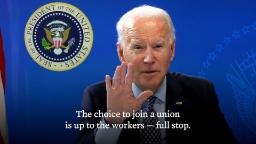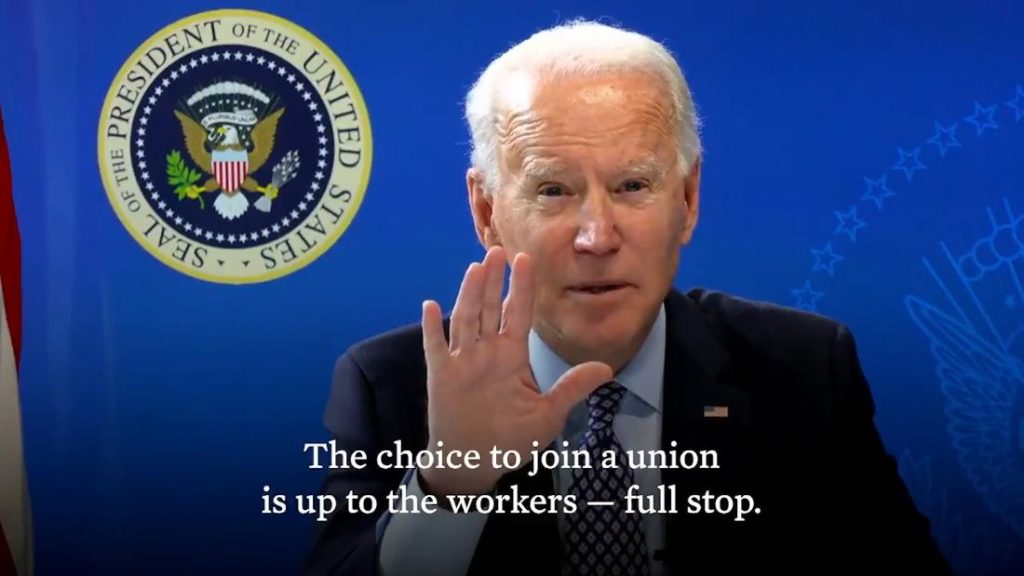
Biden’s video was one of the many presidential gestures that often fail to break through Washington’s cacophony but raise real hopes in the places they target. Though seen as a centrist on many progressive causes, Biden tends to view big economic questions through the eyes of American workers — even his foreign policy mission statement is promoting global initiatives that lift them up. He often says unions “built the middle class,” and the son of Scranton lights up when he gets to campaign in a union hall, surrounded by firemen or fitters.
His video comes at a moment when the plight of blue-collar workers in the US is suddenly politically fashionable. Democrats have been thwarted by a Senate rule from inserting a raise to the federal minimum wage in Biden’s massive Covid-19 rescue bill but are vowing to try again. And Trump-brand Republicans — despite the ex-President’s huge tax cuts for corporations — are pitching themselves as the voice of the White working class and seeking to chip away at a traditional Democratic voting bloc.
Meanwhile: What’s it like to try to get the news in Hungary?
“There is a systematic war going on against independent media all over the country, from small to large issues. The sole aim of that is to have a unified message all around Hungary, which is, of course … a no-go in any democracy. In the eyes of the Orban government, the informed voter is a very dangerous person because he thinks — he uses his mind and makes his own judgment.”
In urban areas, people can still get the news they want online, Hardy says. But “in the countryside, or in those areas where there is poverty is prevailing, it’s only the government-controlled media that is available. And of course people who have difficulty in making a day-to-day living, they won’t go hunting for independent media, I’m sure.”
Meanwhile: How has the broadcast ban affected Klubrádió so far?
“Actually, we have a feeling that this was a very successful migration of listeners to the internet, because we get the same responses from our audiences during interactive phone-in-type radio shows. So that’s one thing. The second sign is that the sale of internet radio appliances has skyrocketed in web shops in Hungary — another sign that people are actually are interested in what we are doing.”
“We should be very grateful to the government for creating this awkward situation, because we have received a $100 million international marketing campaign, ranging from Japan to the US — certainly something that we couldn’t afford — because all serious media outlets have supported us and reported on this story.”
Meanwhile: What should the EU and US be doing to support democratic freedoms in Hungary?
“All freedom and liberty can be achieved only by the Hungarian people, so it would be extremely naive to think that the EU or the US or any other democratic states can achieve this. It must be the Hungarians who fight for it. However, their support is very important and the EU can do a lot of things by stopping financing (to the Orban government).
“If Hungary and Poland applied for EU membership now, they would be rejected, that’s for sure — the state of democracy and rule of law in Hungary today are simply not compatible with EU principles. The problem is that the EU was devised among states that share the same values, more or less. Nobody ever thought that once a country joined the EU, they would go back on the principles of democracy. So there were no mechanisms for how to react to that.”
Meanwhile: What does the future look like? Any hopes that the new US administration could make a difference?
Hardy speculates that Hungary might occupy a bigger spot on the Biden administration’s radar due to the family ties to Hungary of the new secretary of state, Antony Blinken — but says the future of Hungarian democracy remains “a big question mark.”
“The biggest problem is that our democracy is too young — it looks back only on about 20 years of actual democracy. That’s one-tenth of what the US used to have — you had 200 years of democratic principles and some of those were very stormy. So imagine it here!”
You may also like
-
Afghanistan: Civilian casualties hit record high amid US withdrawal, UN says
-
How Taiwan is trying to defend against a cyber ‘World War III’
-
Pandemic travel news this week: Quarantine escapes and airplane disguises
-
Why would anyone trust Brexit Britain again?
-
Black fungus: A second crisis is killing survivors of India’s worst Covid wave

